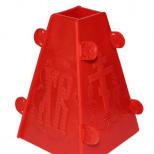Higher military education by correspondence. Military education via correspondence
An officer is bearing, a commanding voice, decisiveness
At all times, many parents think about their sons taking a worthy place in life, growing up strong, healthy, and purposeful. And service in the Army has always been prestigious. Many boys dream of a professional career since childhood. military career, the beginning of which is admission to higher education Military School. And although the military caste is closed, which is determined by officer service in remote places, ordinary citizens, through the efforts of the media and state propaganda, create the feeling that the military is doing well now and will be even better in the future. Is it time to send our sons to military schools and prepare our daughters to marry officers?!
Officer - is this prestigious now?
But how many are now ready to serve as officers in Russian Army? The army is a very expensive pleasure, but the state cannot yet exist without it. The beginning of the 21st century was marked by numerous “color” revolutions in a number of countries, including in the territory former USSR, Middle East. The top leadership of the Russian Federation was forced to think about the state of affairs in the Armed Forces and undertake radical reforms (already the seventh in the entire thousand-year history of Russia). It was possible to do something in this direction: reduce the service life of ordinary personnel to one year, the size of the army itself to 1 million people. A law was passed prohibiting the dismissal of officers without the provision of living space. With the adoption of the law “On the Status of Military Personnel” in 2005, benefits for university cadets were abolished, including for travel on public transport.
On the reform of military education
Great changes have also occurred in the field of military education. Many higher military schools, which trained junior command staff for all branches of the military, were disbanded, and military departments in many civilian universities were closed. Higher military institutions, including all academies, including the Academy of the General Staff, were also reformed. In 2010 and 2011, the recruitment of cadets to all higher military educational institutions in the country was completely stopped. In 2012, enrollment was resumed, reducing the total number of cadets from 15,000 to 8,000. This is explained by the desire to retain young cadres of lieutenants in the army who have served for 2-3 years. Since the concept of military reform provides for a reduction in the officer corps from 355,000 to 150,000 people, the army found itself with many extra officers with military service experience.
The Moscow Region also had big plans for military universities in Moscow and St. Petersburg. It was planned to transfer some of them to the regions. Here purely commercial interests came to the fore: mostly university buildings are located near the centers of both capitals, where land and real estate are very expensive. But no one thought about the fact that the value of any university is, first of all, determined by its teaching staff. It is naive to assume that teachers will willingly leave federal center into the wilderness of the Russian outback.
The fundamental changes in officer training can be judged from the following data: in the Soviet Union, command personnel were trained in 166 military universities. The annual output was about 60,000 officers. Today, the need for officers has decreased by 7 times, and the number of senior educational institutions and their branches - 3.5 times. There are only 17 military universities left throughout Russia, including 3 educational and scientific centers of the branches of the Armed Forces of the Russian Federation, 11 military academies, 3 military universities. They include 25 branches of universities and 3 research organizations. And although the declared minimum officer salary since 2012 is 50,000 rubles, there has not been a large influx of future cadets (less than 5 people per place). Preferences for Suvorov and Nakhimov students when entering military universities have been cancelled.
How should one study at military higher educational institutions?
Considering that officer training is aimed at a special type civil service- military, many specific requirements must be taken into account. First of all, this is, of course, the Unified State Exam. Its results play an important role. But future cadets need to be prepared for a health check, physical training. Additional testing of possible applicants is also provided in order to assess their moral and psychological conditions.
Girls are also recruited into military universities, but only for specialties that they can better master. These are all types of support - logistics, medicine, communications, work with electronics, weather service, stowing parachutes and more. There is no talk of commander positions yet, but there are such plans. Girls enter separately and they have a competition of 25-30 people per place.
The scholarship for a military cadet is 6,000 rubles, but there are very strict requirements for studying. All those who fail in at least one subject are expelled in the first session. On the other hand, the state is moving away from barracks life, cadets live in modern dormitories, with free access to the city. The latest computer technologies with three-dimensional images, interactive methods and forms of teaching, and electronic boards are increasingly becoming part of educational practice. After graduating from a military university, excellent students are guaranteed the best prestigious positions in the army, and those who studied at an average level can be assigned to sergeant positions, while maintaining their officer rank.
Military specialties are taught for free . Moreover, the cadets are in many ways fully provided by the state: uniforms, three meals a day, accommodation in dormitories. And their stipend is almost 2-3 times higher than that of students. But many military universities provide training in civilian related professions on a paid basis. The differences between cadets and students are significant: after graduation, cadets are awarded the officer rank of lieutenant, students are not. Already at the university, the life of cadets is organized according to the Charter around the clock: daily routine, outfits, guard duty, physical and drill training, etc. Students feel much more at ease. There are no benefits provided for cadets. Students at all military universities receive a deferment from military service. But in the army, officers retire faster. To do this, they must have 20 years of continuous service as an officer.
Only students are called up for military training after full-time graduation from a civilian university, if there is a military department, and who are fit for military service for health reasons. After completing military training, they are awarded the rank of reserve lieutenant.
Transferring from a military university to a civilian one and back is impossible, since studying in military educational institutions is equivalent to serving in the army, but in civilian ones it is not. To transfer, you must first drop out, but in some cases (when signing a contract) you will have to reimburse the funds spent on training. Moreover, if you studied at a military school for two years or more, and then dropped out and transferred to a civilian university, the deferment from the army remains. If it's less, they can take it away.
What does Moscow offer to graduates who want to become cadets? Officers aimed at improving their qualifications?
This academy is engaged in education, training and advanced training of the highest and senior command of the Armed Forces, as well as other ministries and departments of the Russian Federation. Managers and officials undergo retraining here federal bodies executive power, military-industrial complex enterprises, officers of foreign states. At the same time, the Academy is the leading military educational center of the Russian Federation, where Scientific research military construction, problems of ensuring military security are studied, concepts are developed for the use of the Armed Forces of the Russian Federation, state and military administration.
In order to enter a military educational institution, you must be liable for military service. Military service will have a very good effect on admission. You can enroll in a military educational institution while directly in the service. Military higher education in absentia - it is prestigious and affordable. divided into:
1. Universities of the Ministry of Emergency Situations of Russia.
2. Universities of the FSB of Russia.
3. Universities of the Russian Border Troops.
4. Universities of the Russian Ministry of Defense.
5. Universities of the Federal Penitentiary Service of Russia.
6. Universities of the Ministry of Internal Affairs of Russia.
7. Universities internal troops Ministry of Internal Affairs of Russia.
8 Suvorovsky, Nakhimovsky, Cadet schools and hulls.
Military higher education has always been highly valued. Entering a military higher education institution is not easy. In addition to knowledge and intelligence, it is necessary to have truly good health. But you can get a higher military education by correspondence. When entering the correspondence department of a higher military educational institution, it is a little easier, and the quality of education remains consistently high.
Rating of Russian military universities 2014
The first place in the list of higher military educational institutions where you can get correspondence education is the Combined Arms Academy of the Armed Forces Russian Federation. This university has 2 training profiles at faculties distance learning: engineering and team. The Academy is rich in its historical heritage. It trained the best officer cadres of our country. Among the students who graduated from it there are many famous and outstanding personalities.
On the third place military Academy Aerospace Defense, located in the city of Tver. The name of the university speaks for itself. There are 2 faculties correspondence education: command and engineering.
Next in the ranking is the Military Academy of Logistics and Technical Support. The honor board of this educational institution is constantly updated with new excellent students, who subsequently become proud armed forces Russia.
The Air Force Academy also trains command personnel at the correspondence faculty.
The Naval Academy in St. Petersburg is also among the top ten highest military institutions. There are 2 profiles at the correspondence faculty: command and engineering.
All these higher military institutions have excellent material resources. The teaching staff consists of well-trained generals and officers. The learning process uses advanced technologies, and there is also the possibility of learning via the Internet.





